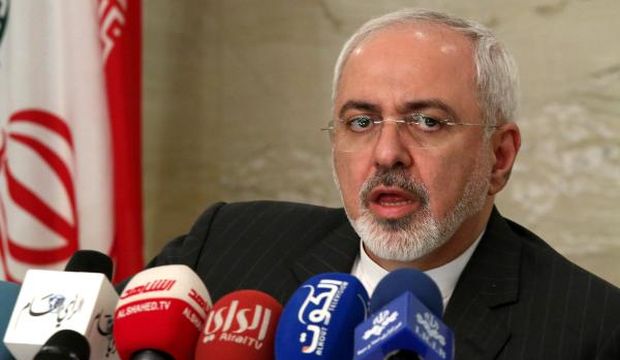
Iran’s Foreign Minister Mohammad Javad Zarif delivers a speech during a press conference in Kuwait City on July 26, 2015 (AFP Photo/Yasser Al-Zayyat)
Dubai and Manama, Reuters/Asharq Al-Awsat—Iran’s Foreign Minister Mohammad Javad Zarif began a charm offensive in the Gulf on Sunday to defend a nuclear deal seen by some Arab states as heralding greater Iranian support for armed groups and governments opposed to the Gulf states.
Most of the Gulf states are worried that Iran’s July 14 accord with world powers will hasten detente between Tehran and Washington, emboldening Tehran to increase backing for Middle Eastern allies at odds with Gulf Arab countries.
Zarif began a one-day, three-country tour by visiting Kuwait. He was due to go on to Qatar and then Iraq.
Iran’s Deputy Foreign Minister for Arab and African Affairs Hossein Amir-Abdollahian, accompanying Zarif, said the goal of this visit was “strengthening ties and developing cooperation in all the fields” with Iran’s neighbors.
“The fight against extremism and violence as well as strengthening regional ties are a fundamental necessity to achieve sustainable development and security in the region,” Amir-Abdollahian told Iran’s state news broadcaster.
Most Sunni Muslim-ruled Gulf Arab states have long accused Tehran of interference in Arab affairs, alleging financial or armed support for political movements in countries including Bahrain, Yemen, and Lebanon.
Shi’ite power Iran denies interference but says the nuclear deal will not change its policies in the region.
Ahead of his Gulf visit, Zarif said in a statement posted on his ministry’s website late on Friday that Tehran would continue supporting its allies in Syria and Iraq to fight against militant group the Islamic State of Iraq and Syria (ISIS).
Echoing that message in a speech on Sunday, Iranian President Hassan Rouhani said on a visit to Iran’s Kurdistan Province: “The Iranian nation supports all oppressed nations.”
“If it wasn’t for Iran, Erbil and Baghdad would have also fallen to the terrorists [of ISIS] . . . Just as we defended Dahuk, Erbil and Suleimaniyah [in Iraqi Kurdistan], if any country in the whole region is a victim of aggression, the Iranian nation will defend the oppressed,” Rouhani added.
Iran-linked plot
Bahrain said on Saturday it had foiled an arms smuggling plot by two Bahrainis with ties to Iran and announced the recall of the Gulf island kingdom’s ambassador to Tehran for consultations after what it said were repeated hostile Iranian statements.
Bahrain’s Interior Ministry said the two men were attempting to smuggle high-grade explosives, automatic weapons, and ammunition into Bahrain via a vessel. Both suspects have admitted receiving the shipment from Iranian handlers outside Bahrain’s waters.
Bahrain’s coastguard recovered the shipment, which included 43.8 kilograms of the explosive material C4, eight Kalashnikovs, as well as ammunition and detonators.
The ministry said initial investigations showed one of the suspects had received military training at an Islamic Revolutionary Guard Corps camp in Iran during August 2013. The suspect was trained in the use of explosive devices and firearms. Both suspects were provided with funds for the operation.
The latest incident follows a number of recent attempts to smuggle explosive materials into and from Bahrain.
In May, authorities arrested several suspects involved in a plot to smuggle high-grade explosives into Saudi Arabia from Bahrain. Iranian mobile phone chips and currency were found at the suspects’ home.
This followed an attempt in April to smuggle similar explosive materials into Saudi Arabia via the King Fahd Causeway linking Saudi Arabia and Bahrain.
